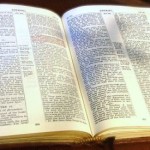We run our website the way we wished the whole internet worked: we provide high quality original content with no ads. We are funded solely by your direct support. Please consider supporting this project.
What’s the significance of Isaiah 63:8-10?
The Lord said (or “thought”) to himself, “Surely they are my people, chidren who will not deal falsely.” So, the text says, “He became their savior” (Isa. 63: 8). But “they rebelled and grieved his holy spirit.” So the Lord “became their enemy” (9-10).
If the future is exhaustively settled from all eternity, how could the Lord expect Israel to behave one way, only to find them later behaving a different way? (cf. Isa 5:1-5 ; Jere 3:6-9; 19-20; 36:3ff).
Category: Q&A
Tags: Open Theism, Q&A
Topics: Open Theism
Verse: Jeremiah 63
Related Reading

Is There Room for Doubt in Faith?
Many Christians today assume that faith is the antithesis of doubt. In this view, a person’s faith is thought to be strong to the extent that they don’t question their beliefs or struggle with God in whom they believe. As widespread as this view is, I believe it is unbiblical and profoundly unhelpful. My experience…

What is the significance of 2 Kings 20:1–7?
The Lord tells Hezekiah “[Y]ou shall die: you shall not recover” (vs. 1). Hezekiah pleads with God and God says, “I will add fifteen years to your life” (vs. 6). If everything about the future was exhaustively settled and known by God as such, his prophecy to Hezekiah that he was going to die would…

Answering an Objection to a Cross-Centered Approach to Scripture
Through Greg’s Facebook and Twitter, we’ve been getting some great feedback and questions regarding his cross-centered approach to Scripture. Several have voiced questions similar to the reader’s (below), so we thought it would be helpful to post Greg’s answer here on his blog.

How do you respond to Daniel 2:31–45?
Daniel interprets Nebuchadnezzar’s dream to the effect that he possesses a kingdom of “gold” (vs. 38). After this there shall arise “another kingdom inferior to yours, and yet a third kingdom of bronze which shall rule over the whole earth. And there shall be a fourth kingdom, strong as iron…it shall crush and shatter all…

How do you respond to Acts 2:23?
Peter preaches to the crowd on the day of Pentecost, “[T]his man [Jesus], handed over to you according to the definite plan and foreknowledge of God, you crucified and killed by the hands of those outside the law.” Jesus’ death was certainly planned and foreknown by God, as the previously discussed verses have repeatedly demonstrated.…
